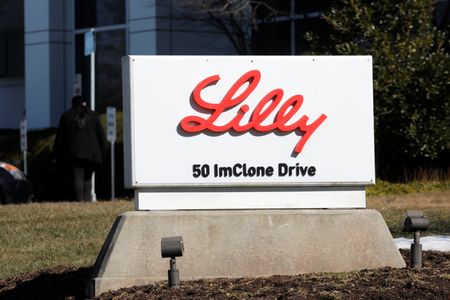
(Reuters) – Eli Lilly and Co on Thursday posted quarterly results that beat Wall Street estimates and said its experimental obesity drug met the main goal in a late-stage study, sending shares of the drugmaker up 4%.
Tirzepatide showed up to 22.5% weight loss in adults with obesity in the study, with the trial also meeting a key secondary goal.
“The data likely validates Street thinking that tirzepatide will become a dominant player in the obesity market,” Wells Fargo analyst Mohit Bansal said in a note, adding that he expects about $4 billion in peak sales.
In the first quarter, sales of blockbuster diabetes drug Trulicity rose 20% and immunology drug Taltz gained 21% on strong demand despite pricing pressures.
Sales of rheumatoid arthritis treatment Olumiant jumped 32%, while revenue from COVID-19 antibody therapies jumped 81% to $1.47 billion.
The drugmaker is banking on its new pipeline of assets as many of its established drugs are facing patent loss.
It plans to launch five more medicines over the next two years, including tirzepatide, which is also under regulatory review for diabetes, and Alzheimer’s disease treatment donanemab.
The company, however, lowered its annual profit forecast as it made some accounting changes to its reporting of adjusted earnings.
It now expects full-year adjusted earnings of between $8.15 and $8.30 per share, compared with its prior forecast of $8.50 to $8.65 per share.
According to IBES data from Refinitiv, Lilly reported adjusted earnings of $2.77 per share, ahead of estimates of $2.32 per share.
Last month, Lilly joined several other drugmakers in scaling back business in Russia after Moscow’s invasion of Ukraine.
The impact of the sanctions on Russia on Lilly has been limited as the company does not have a big presence in the country, Chief Executive Officer David Ricks told CNBC on Thursday.
(Reporting by Mrinalika Roy and Leroy Leo in Bengaluru; Editing by Amy Caren Daniel)

